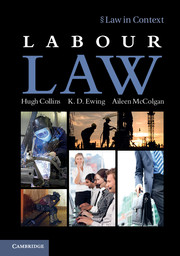Book contents
- Frontmatter
- Contents
- Preface
- Acknowledgments
- Table of cases
- Table of statutes
- Table of statutory instruments
- Table of European Union instruments
- Table of ILO instruments
- Table of other international instruments
- Abbreviations
- Part I Introduction
- Part II The contract of employment
- Part III Statutory regulation of the employment relationship
- Part IV Collective labour rights
- 12 Freedom of association and the right to organise
- 13 Freedom of association and trade union autonomy
- 14 The right to bargain collectively
- 15 The right to be informed and consulted
- 16 Collective action and the right to strike
- 17 Liability for collective action
- Part V Termination of employment
- Index
- References
14 - The right to bargain collectively
from Part IV - Collective labour rights
- Frontmatter
- Contents
- Preface
- Acknowledgments
- Table of cases
- Table of statutes
- Table of statutory instruments
- Table of European Union instruments
- Table of ILO instruments
- Table of other international instruments
- Abbreviations
- Part I Introduction
- Part II The contract of employment
- Part III Statutory regulation of the employment relationship
- Part IV Collective labour rights
- 12 Freedom of association and the right to organise
- 13 Freedom of association and trade union autonomy
- 14 The right to bargain collectively
- 15 The right to be informed and consulted
- 16 Collective action and the right to strike
- 17 Liability for collective action
- Part V Termination of employment
- Index
- References
Summary
Introduction
Workers join trade unions for a purpose, usually to secure the benefits of higher wages, better conditions of employment, and greater job security, generally gained by a process of collective bargaining. As already explained in Chapter 12, by this process trade unions and employers negotiate a collective agreement to regulate working conditions and to resolve disputes at the workplace. At one time more than two-thirds of the workforce had their terms and conditions of employment regulated in this way, and even today the terms and conditions of just under one-third of workers are regulated by such agreements. Collective bargaining thus continues to be an important process, given that collective agreements are likely also to have an important indirect impact, in the sense that they will influence the terms and conditions of employment of workers beyond those immediately affected by them. In this chapter, we consider the role of the law in the collective bargaining process, the importance of which is recognised in a number of international treaties and by the law and practice of all developed countries.
The role of the state in the collective bargaining process arises in a number of ways. The first relates to the need to establish collective bargaining machinery, the role of law arising where it is not possible for the parties to agree to such machinery being established voluntarily. The second is the duties on the parties in the collective bargaining process, in terms of the way they conduct themselves and the steps taken to ensure that bargaining takes place in a transparent and informed way. And the third relates to the legal status and effects of collective agreements. Are they legally binding contracts? What is their effect on the contract of employment? In Britain, conventional wisdom is based on Kahn-Freund's ideas of ‘legal abstention’ and ‘collective laissez faire’, whereby the state was largely removed from the process of collective bargaining, which was left to the self-regulation of labour and capital. But although a profound insight, ‘collective laissez faire’ is a principle that may tend to under-estimate the active involvement of the state in building and sustaining collective bargaining institutions in the past, and focus too narrowly on particular forms of state intervention.
- Type
- Chapter
- Information
- Labour Law , pp. 537 - 592Publisher: Cambridge University PressPrint publication year: 2012



